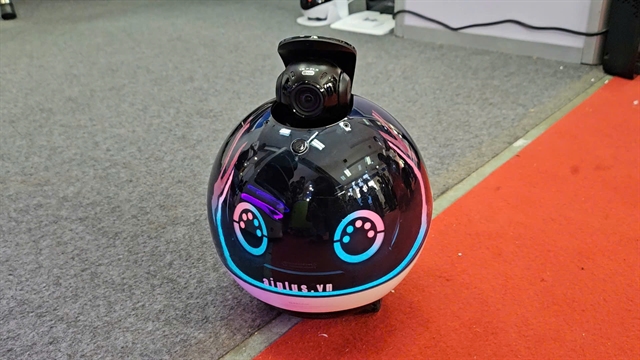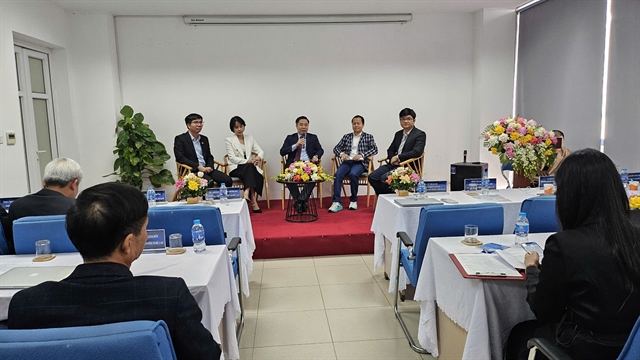 Economy
Economy

 |
| A product with AI application was displayed at a trade fair in Hà Nội. — VNS Photo Ly Ly Cao |
By Ly Ly Cao
HÀ NỘI — Artificial Intelligence (AI) has emerged as a transformative force within Vietnamese enterprises, aligning with the broader trends of digital transformation and Industry 4.0.
From optimising business processes to creating new value propositions, experts say, AI is redefining how companies operate and compete.
Vietnamese businesses are increasingly embracing AI as a critical enabler of growth and innovation. A report from Viettel AI highlights that enterprises worldwide are increasing their exposure to AI, signalling the global momentum that Việt Nam is also experiencing.
"Vietnamese enterprises understand that AI is no longer optional but essential," said Vũ Thị Hạnh, a solutions consultant at Viettel AI.
Her comments were delivered at a seminar on 'Applying AI in Enterprise Management at Hòa Lạc Hi-Tech Park' that was organised by the Management Board of Hòa Lạc High-Tech Park on December 24.
Leading corporations such as FPT, Viettel and VinAI have made significant strides by developing localised large language models (LLMs) tailored to the Vietnamese context.
For example, Viettel AI in 2023 launched its Vietnamese LLM, VDA, which processes local dialects with high accuracy, enhancing customer service and content generation.
Key applications of AI
AI's integration spans various sectors and functions, revolutionising operational efficiency and customer engagement.
AI-powered chatbots and virtual assistants are transforming customer service by providing instant, personalised responses. Companies like FPT and Viettel are deploying these solutions to enhance user satisfaction.
In supply chain and operations, predictive analytics and anomaly detection are optimising logistics and inventory management. By leveraging AI, enterprises can forecast demand, reduce waste, and ensure smooth operations.
Moreover, AI-driven recommendation engines and predictive modelling enable businesses to target the right audience with precision, boosting conversion rates.
Intelligent automation is streamlining recruitment processes and performance evaluations.
Meanwhile, for finance and accounting expertise, Robotic Process Automation (RPA) and AI accounting assistants are reducing manual workloads, enhancing accuracy and improving compliance in financial operations.
Vietnamese enterprises are evolving from digital transformation to intelligent transformation, leveraging big data and AI for data-driven decision-making.
This shift focuses on creating intelligent, personalised products and services that cater to specific customer needs. For instance, AI-enabled platforms now provide market forecasts, helping businesses anticipate trends and adapt strategies effectively.
"AI not only helps optimise operating processes and save costs, but also creates new value through effectively exploiting data and predicting trends," said Trần Đắc Trung, Deputy Manager of the Hòa Lạc Hi-Tech Park.
 |
| Delegates at the seminar on December 24. — VNS Photo Ly Ly Cao |
Challenges in AI implementation
Despite the progress, challenges persist.
A survey by Deloitte revealed that 32 per cent of organisations struggle with the accuracy of generative AI tools and 38 per cent cite cybersecurity risks as a major concern.
Additionally, issues such as data privacy, workforce readiness and ethical considerations require immediate attention to ensure sustainable AI adoption.
"AI potential is immense, but so are its risks. Navigating these requires both strategy and attention,” Hạnh added.
The Vietnamese government and private sector are fostering an ecosystem conducive to AI innovation.
The Hi-Tech Park in Hòa Lạc serves as a hub for AI development, offering resources and a collaborative environment for startups and established players. Workshops and forums will provide platforms for knowledge sharing and strategic alignment.
"We aim to build a community where ideas can thrive and collaborations can lead to groundbreaking innovations," said Trần Đắc Trung during the seminar.
To fully harness AI potential, Vietnamese enterprises must invest in up-skilling and re-skilling programmes for employees to prepare the workforce for AI-centric roles.
"Continuous learning is the key to thriving in the AI era," said Hạnh.
She also stressed the importance of building infrastructure with robust data storage and processing capabilities which are critical for scaling AI initiatives.
Additionally, transparent AI governance frameworks must be established to mitigate risks and build trust. — VNS




